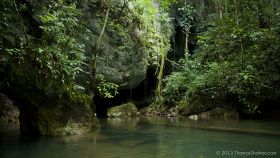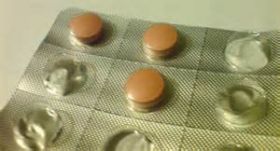In Belize, do I have to worry about malaria, yellow fever and other diseases we don’t generally have in North America?
Boris Mannsfeld - Boris Mannsfeld & Associates
Those people who go out in the jungle, stay there for two weeks on a survival course, and get bitten by bugs are the ones who are prone to getting malaria. They should probably take malaria medicine. In terms of the general tourists and the people living here, I do not see any reason to take medicine for malaria. I have never taken medicines for malaria in Belize. I have been all over the world, and I have taken these medicines before when I went to places where it is probably needed, but...
Those people who go out in the jungle, stay there for two weeks on a survival course, and get bitten by bugs are the ones who are prone to getting malaria. They should probably take malaria medicine. In terms of the general tourists and the people living here, I do not see any reason to take medicine for malaria. I have never taken medicines for malaria in Belize. I have been all over the world, and I have taken these medicines before when I went to places where it is probably needed, but here in Belize, it is not an issue. Yes, malaria exists here because this is a tropical rainforest. Malaria is in every tropical rainforest in the world, but I do not think it is a concern for any tourist or any person retiring here in Belize.
In terms of Ebola and all those other infectious diseases, we haven’t had any issue with any of those. I know there were some diseases that spread over Mexico and then over to the United States, but luckily, we did not have a lot of those cases down here in Belize.
In terms of Ebola and all those other infectious diseases, we haven’t had any issue with any of those. I know there were some diseases that spread over Mexico and then over to the United States, but luckily, we did not have a lot of those cases down here in Belize.
Posted December 1, 2014
Christian Burn
Unfortunately, Belize is a malaria region. If you are spending time on the mainland, you have to take anti-malarial medication. Not everybody is excited about that, but it is certainly a better way to deal with it than to use bug repellant. You sweat so much here that the bug repellant wears off and you can get a bite, which could lead to malaria. It is better to take the anti-malarial medicine because that would help. Again, that is if you are going to the mainland. Here on the islands,...
Unfortunately, Belize is a malaria region. If you are spending time on the mainland, you have to take anti-malarial medication. Not everybody is excited about that, but it is certainly a better way to deal with it than to use bug repellant. You sweat so much here that the bug repellant wears off and you can get a bite, which could lead to malaria. It is better to take the anti-malarial medicine because that would help. Again, that is if you are going to the mainland. Here on the islands, we do not have any issues like that. The occasional dengue fever will come up, but not the more dangerous diseases like yellow fever or typhoid fever. If you’re spending time on the mainland or if you live on the mainland, I suggest you take anti-malarial medicines weekly. If you're prone, then taking a bath and using a bug repellant every day would also suffice. Spray it everywhere.
Anti-malarial medicines work and ironically that is how the British made tonic so popular in the tropics, because tonic has quinine, which is a natural anti-malarial. They drank gin and tonic saying they are doing good because it was medicine. Quinine is “old school” stuff, but that is what you find in the tonic water.
Now we have better anti-malarial than quinine, which is a very powerful substance and it is bitter; it doesn't taste very good.
If you are a diver, you have to be a little bit more cautious when taking anti-malarial drugs because some of them are contraindicated for diving because they have certain effects at certain depths.
If you are a diver, you can take a less potent antimalarial because it has less side effects under water.
Anti-malarial medicines work and ironically that is how the British made tonic so popular in the tropics, because tonic has quinine, which is a natural anti-malarial. They drank gin and tonic saying they are doing good because it was medicine. Quinine is “old school” stuff, but that is what you find in the tonic water.
Now we have better anti-malarial than quinine, which is a very powerful substance and it is bitter; it doesn't taste very good.
If you are a diver, you have to be a little bit more cautious when taking anti-malarial drugs because some of them are contraindicated for diving because they have certain effects at certain depths.
If you are a diver, you can take a less potent antimalarial because it has less side effects under water.
Posted December 2, 2014
Macarena Rose - Rainforerst Realty

In Belize, we have dengue, which has similar symptoms to malaria. Malaria is extremely rare, not a common thing at all in Belize. To illustrate this, I got malaria once, and when the doctor took the blood work, he came back later in the day to take blood again because he didn't believe the results the first time. It was a house call. How wonderful is that?
The doctor came to the house a second time, and said, “Macarena,...

In Belize, we have dengue, which has similar symptoms to malaria. Malaria is extremely rare, not a common thing at all in Belize. To illustrate this, I got malaria once, and when the doctor took the blood work, he came back later in the day to take blood again because he didn't believe the results the first time. It was a house call. How wonderful is that?
The doctor came to the house a second time, and said, “Macarena, the test came out wrong. It says you have malaria and we know that cannot be possible.”
So I let Dr. Sanchez take my blood and he came back again and confirmed that yes, it is malaria, but it is extremely rare. So when I tell people that I had malaria, it is such an anomaly because I do not know anyone else who has had malaria.
I had a property way out in the deep jungle near the Manatee area of the coastal road of Belize. There are in-cave systems and in-through areas that were not inhabited for a long time, and the only thing we can figure out is that I picked up something that was dormant there. (Cave in Barton Creek, Belize, pictured.)
When you move to Belize, you have to know that all water systems are not all equal, so most people drink bottled water. As far as bathing and cooking and everything else, we use the regular water that we call "pipe water," better known as "tap water."
The interesting thing for me is that a lot of people come here and they take all these inoculations and get on these anti-malarial medicines and others things that aren’t really needed. If you are coming to Belize, save yourself the time and effort, because you don't need these things.
Coming from St. Petersburg, Florida, you might be worried about catching a flu or catching something from someone who has the sniffles, just like you would in Belize.
Posted January 27, 2015
Bentley Wildman - Consejo Shores
 We have had cases of malaria and dengue fever in Belize, but we've had very few cases in the Corozal district (in the far northern part of the country). You find them more in Toledo District (where Punta Gorda is located) and up in the west in the Cayo area. I can't say these diseases don’t exist because they do, but we never had an epidemic of it.
We have had cases of malaria and dengue fever in Belize, but we've had very few cases in the Corozal district (in the far northern part of the country). You find them more in Toledo District (where Punta Gorda is located) and up in the west in the Cayo area. I can't say these diseases don’t exist because they do, but we never had an epidemic of it. The areas where these diseases are most prevalent are in or near the jungle, and where...
 We have had cases of malaria and dengue fever in Belize, but we've had very few cases in the Corozal district (in the far northern part of the country). You find them more in Toledo District (where Punta Gorda is located) and up in the west in the Cayo area. I can't say these diseases don’t exist because they do, but we never had an epidemic of it.
We have had cases of malaria and dengue fever in Belize, but we've had very few cases in the Corozal district (in the far northern part of the country). You find them more in Toledo District (where Punta Gorda is located) and up in the west in the Cayo area. I can't say these diseases don’t exist because they do, but we never had an epidemic of it. The areas where these diseases are most prevalent are in or near the jungle, and where there’s more water and rain during the rainy season. Corozal, especially Consejo Shores where we are, is the driest part of Belize. As you go to the south it gets wetter and wetter during the rainy season.
Overall, I don't think the North Americans in Belize worry about it too much. The local people are always on the radio advising not to leave standing water sitting around your house where the mosquito larvae can grow, and other similar precautions.
I contracted malaria here when I was working in the Cayo area. I went to the local doctor and he gave me some pills and in three days, I was better. Getting malaria is not something that life-threatening unless you're a really young child or a very old weak person.
In Central America, getting malaria is like getting a bad flu. What happened with me was I went a little bit delirious and my wife woke me up. I had cold sweats in the middle of the night and by the morning I was fine. Given these symptoms, I figured that there was something wrong. So I went to the doctor and he just said, “You've got malaria. Take these pills and you'll be better.” In three days I was better. Getting malaria in Belize is not a really serious thing where you have to stay in the hospital or anything like that.
(Malarone malaria pills, pictured.)
Posted July 16, 2015


